NEWS: Looking back at the best of our 2018 reporting
COMMENTARY, Brack: Add sensible gun reform to state’s priorities
SPOTLIGHT: The South Carolina Education Association
MY TURN, Bailey: The business of health care is getting bigger – in more ways than one
FEEDBACK: Lawmakers need to protect our coast, more
MYSTERY PHOTO: Building with interesting shape
S.C. ENCYCLOPEDIA: Columbia College
NEWS: Looking back at the best of our 2018 reporting

By Andy Brack, editor and publisher | When Statehouse Report was born 17 years ago, its mission was to provide better context and insight into public policy issues impacting the Palmetto State.
Traditional media, we explained to underwriters and supporters, provide pretty good daily coverage of what’s happening in the Palmetto State – although we point out today that the press corps of 2018 is a shadow of its former size. Still, newspapers, radio and television provide immediate insights into what’s happening at the Statehouse. (It would be better to have more watchdogs, many agree.)
But there seemed to be an opportunity in media coverage – to provide depth and insight on critical issues in areas where South Carolina lags – education, health care, taxing wisely and more. Statehouse Report continues to fill that niche of media coverage.

Over the last year, correspondent Lindsay Street has provided an array of outstanding news stories that are ahead of the traditional media curve and provide context for complex issues affecting the state. Here’s a look back at some of our best news coverage for 2018. You’ll see more of this kind of reporting in 2019.
Ahead of the curve
New budget keeps underfunding education by hundreds of millions (March 30):
“Education advocates in the state are cheerleading the Senate’s draft budget for its focus on K-12 education, but they say work still needs to be done to restore the main stream of funding for public schools in South Carolina. State law requires per-student funding for public schools to be $2,959 per year in the 2018-19 budget. But proposed funding for the coming year remains hundreds of millions below required levels.”
Higher ed underfunded by billions, lottery audit says (June 15):
“A new independent state audit of South Carolina’s education lottery spending is a damning critique of the way the legislature appropriates education dollars. Two glaring rebukes stand out in the June report, ‘South Carolina’s Use of Education Lottery Account Funds,’ by the Legislative Audit Council: Underfunding and education funding murkiness.”
Teacher group pushes educators to advocate more (Aug. 10)
“A new South Carolina group of educators says teachers in the Palmetto State don’t want to walk out like peers around the nation who are fighting for higher pay. But the group says it is putting pressure on the General Assembly to raise wages that long have been lower than average.”
“Student Bill of Rights” hits false note, critic says (May 18):
“A state higher education watchdog and advocate is ringing alarms all over the state about the increasing costs of college tuition and a dwindling number of college students. But its recently released “student bill of rights” — aimed at furthering dialogue on higher education — has hit a false note for some.”
Southern Strategy, now 50, is still churning politics (Sept. 7):
“It has been 50 years since candidate Richard Nixon put into action a South Carolina adviser’s plan to prey upon fear and race to get white voters to cast ballots for the GOP. Devised as a “Southern strategy” by native son Harry Dent Sr., South Carolina political observers say the 1968 initiative is far from something in the history books. Rather, it’s alive and well, a continuing font of inspiration for Republican campaigners in an age where rage and race fuels tweets from the current president on down.”
S.C. sits back as others bird-dog regulating emerging tech (Aug. 31):
“State legislatures across the country are taking notice of an emerging technology called “blockchain” that could upend how businesses operate and create a need for regulatory framework. But while South Carolina’s attorney general has made headlines for issuing cease-and-desist letters to two companies using the technology behind the digital currency Bitcoin, South Carolina lawmakers appear flat-footed when it comes to policy to regulate it.”
State’s federal dollars at risk if census participation low, lawmaker says (Nov. 9):
“An accurate population count in 2020 is needed to keep South Carolina’s share of billions of dollars in federal funding from decreasing, according to advocates. South Carolina, where a third of its annual revenues comes from the federal government and more than 15 percent of its residents live in poverty, could be among those states seeing less federal money than needed to take care of its population due to an added question on the 2020 census of a responder’s and their household’s citizenship status, according to plaintiffs in a federal lawsuit.”
Plan to ‘defund’ Planned Parenthood could also expand family planning services (April 6):
“A South Carolina agency is seeking to block public money from going toward family planning services at most non-primary care facilities — a move that would strip Medicaid dollars from any abortion-providing clinic in the state. But in justification of that move, the plan also includes expanding family planning services to make them more comprehensive and address chronic health care problems.”
Coverage gap could halt Medicaid work requirement in South Carolina (June 1):
“While the Trump administration has given the green light for states to restrict Medicaid access by requiring recipients to work, there’s a catch that could derail the effort in South Carolina.”
Bipartisan effort seeks to create child advocacy watchdog (Jan. 19):
“After two years of frightening stories about how an understaffed state agency failed to protect children in its care, two state senators are proposing the creation of a consolidated, watchdog children’s advocate.”
Giving context to big issues
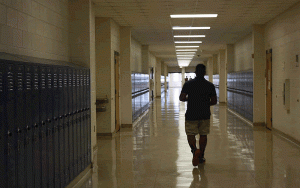 Legislators eye education fixes after shaky student snapshots (Sept. 13):
Legislators eye education fixes after shaky student snapshots (Sept. 13):
“The annual snapshot of South Carolina’s public school students shows a majority is not meeting grade-level expectations in math or English language arts. With nearly one in four students struggling in those subject areas, an education policy discussion is boiling in the state.”
Catastrophic floods prompt proactive look at disasters (Sept. 21):
“A Charleston lawmaker has teamed with environmental groups to draft two pieces of legislation to help South Carolina become more proactive on flooding. The bills would help move people from low-lying areas and steer future development toward higher ground.”
Lawmakers grapple with question of nuclear regulation (Aug. 24):
“A leak of nuclear material at a Columbia-area uranium fuel plant has prompted lawmakers and neighbors to ask why they weren’t notified as fears of groundwater contamination are renewed.”
What women want: A safer, better South Carolina for themselves and others (Oct. 5):
“The silhouettes representing 29 women slain by men stood silent on the Statehouse steps this week. For some public leaders and advocates, the women were emblematic of a deep cultural problem that can and should be further unraveled with the help of state policy.”
S.C. weaves tapestry of rural health solutions (Sept. 28):
“State leaders are seeking to weave a tapestry of solutions to improve health outcomes for rural South Carolinians, facing deadly threats from preventable and chronic diseases, exacerbated by dwindling places providing primary care.”
S.C. worker shortage in hospitality nears “crisis stage,” experts say (June 22):
“A tightening labor pool and declining wages could spell trouble for one of the state’s biggest economic engines: hospitality. ‘It’s almost in a crisis stage that we can’t fill all of the positions available,’ said Linn Lesesne, co-owner of Charming Inns, a small business comprising four inns and two restaurants in Charleston. ‘We’re constantly looking for front desk and housekeeping and line cooks, we always have positions available.’”
The 2018 session: What’s done and what’s not finished (May 11):
“The second year of the biennial session wrapped up Thursday with some big items left undone, including funding state government and lawmakers’ response to the $9 billion nuclear fiasco that sucked oxygen from the Statehouse for months.”
Ethics reform may be dead this year, despite public support (March 2):
“Ethics reform came in like a lion as lawmakers reconvened in January, but it could depart the session like a lamb – tamed as lawmakers pivoted to other issues such as utility reforms.”
- Have a comment? Send to: feedback@statehousereport.com
BRACK: Add sensible gun reform to state’s priorities
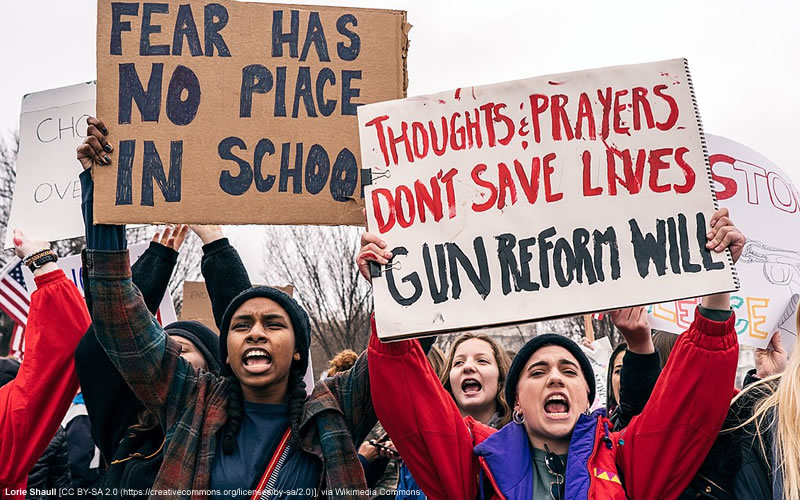
By Andy Brack, editor and publisher | It’s past a reasonable time for the General Assembly to add sensible gun reform to its to-do list. In 2019, state lawmakers must get something done.
 Three and a half years ago, a madman gunned down nine people at Emanuel AME Church in Charleston, including the state senator who served as the church’s pastor. Among the gunman’s weapons was a handgun bought after expiration of a three-day waiting period for a background check. If federal examiners had more timely access to state and local law enforcement records, “they would have seen that he admitted to being in possession of a controlled substance and denied [his] purchase of the .45-caliber Glock handgun he later used at the church,” according to the Charleston City Paper.
Three and a half years ago, a madman gunned down nine people at Emanuel AME Church in Charleston, including the state senator who served as the church’s pastor. Among the gunman’s weapons was a handgun bought after expiration of a three-day waiting period for a background check. If federal examiners had more timely access to state and local law enforcement records, “they would have seen that he admitted to being in possession of a controlled substance and denied [his] purchase of the .45-caliber Glock handgun he later used at the church,” according to the Charleston City Paper.
Since the tragedy, several S.C. lawmakers offered state legislation to close the loophole that allowed thousands of people in 2016 in the U.S. to get guns because the time period background checks ran out. In 2018, a bipartisan-backed reform measure stalled, just as it had in years before.
Legislators in 2019 should demand a vote on closing what has been called the “Charleston loophole” to extend the waiting period for purchasing guns from three days to five days. (More than 90 percent of background checks reportedly are cleared within two minutes.)
Closing the loophole would not take away anyone’s right to buy a gun, except people with criminal records – and felons shouldn’t have guns anyway. That’s why sensible gun reform is being added to Statehouse Report’s list of Palmetto Priorities for 2019.
Ten years ago, we urged lawmakers to develop common priorities – a plan for legislation – to allow them to get real things done to move South Carolina forward. Here’s what we called for 10 years ago:
“If you don’t have a policy map for where you want to be headed, you will flounder in proposal after proposal. Therefore, today we highlight 11 broad continuing objectives for state legislators to consider and use as a bipartisan guide to creating a better South Carolina.”
During the last decade, we’ve removed two priorities that were accomplished – increasing the state’s cigarette tax to $1 a pack to curb smoking and associated health risks, and increasing voter registration to 75 percent.
 But there’s still a lot of work to be done in a legislature that gets easily sidetracked by pet interests and debates over social policy affecting the few, not the many. Here is an updated and improved list of Palmetto Priorities for 2019:
But there’s still a lot of work to be done in a legislature that gets easily sidetracked by pet interests and debates over social policy affecting the few, not the many. Here is an updated and improved list of Palmetto Priorities for 2019:
GUN REFORM (new): Close the “Charleston loophole” in 2019 to extend the waiting period for purchasing a gun to at least five days to allow federal examiners more time for background checks. Consider other reasonable reforms to reduce gun violence in South Carolina.
POVERTY. Develop a broad-based anti-poverty agenda by 2020 that includes the jobs, education and health care components listed below to help lift the almost one in five South Carolinians in poverty into better conditions.
JOBS. Approve a Cabinet-level post by 2020 to add and retain 10,000 small business jobs per year. Politicians talk about helping small businesses. This would force them to.
EDUCATION. Cut the state’s dropout rate in half by 2020.
HEALTH CARE. Ensure affordable and accessible health care that optimizes preventive care for every South Carolinian by 2020. Expand Medicaid. Medicare. More people need to be on health insurance, not less.
ENVIRONMENT. Adopt a real state energy policy that requires energy producers to generate 20 percent of their energy from renewable sources by 2020.
TAXES. Overhaul and stabilize the state’s antiquated tax structure by 2020 through reforms that broaden the tax base and lower rates. This should include reimplementation of reasonable property taxes and removal of hundreds of millions of dollars of special-interest sales tax exemptions.
CORRECTIONS. Cut the prison population by 25 percent by 2020 through creative alternative sentencing programs for non-violent offenders.
ROADS. Develop and implement a plan that creatively taps several sources to generate more millions of dollars every year for investment in the state’s crumbling system of roads and bridges, and start pigeon-holing money for significant investments in public transit.
POLITICS. Have a vigorous two- or multi-party political system of governance, i.e., abandon gerrymandering of election districts.
- Have a comment? Send to: feedback@statehousereport.com.
SPOTLIGHT: The South Carolina Education Association
 The public spiritedness of our underwriters allows us to bring Statehouse Report to you at no cost. This week’s spotlighted underwriter is The South Carolina Education Association(The SCEA), the professional association for educators in South Carolina. Educators from pre-K to 12th grade comprise The SCEA. The SCEA is the leading advocate for educational change in South Carolina. Educators in South Carolina look to The SCEA for assistance in every aspect of their professional life. From career planning as a student to retirement assessment as a career teacher, The SCEA offers assistance, guidance, and inspiration for educators.
The public spiritedness of our underwriters allows us to bring Statehouse Report to you at no cost. This week’s spotlighted underwriter is The South Carolina Education Association(The SCEA), the professional association for educators in South Carolina. Educators from pre-K to 12th grade comprise The SCEA. The SCEA is the leading advocate for educational change in South Carolina. Educators in South Carolina look to The SCEA for assistance in every aspect of their professional life. From career planning as a student to retirement assessment as a career teacher, The SCEA offers assistance, guidance, and inspiration for educators.
- Learn more: thescea.org
MY TURN: The business of health care is getting bigger – in more ways than one

By Lynn Bailey, special to Statehouse Report | Health care is big business in South Carolina, amounting to 22 percent of the state’s total economic output, compared to 18 percent nationally.

But the big health story impacting South Carolina in 2018 was the growth in health mergers, both national and across the state. Health care is getting big or bigger. Big Pharma, for example, controls the quality and prices of old and new medicines. Large hospital-centered health systems control inpatient care, outpatient care and many of our doctors. They compete for the dollars controlled by Big Government (Medicare, Medicare and big health insurance companies).
It gets bigger nationally. United Healthcare, the country’s largest insurance plan, now owns providers hospitals, outpatient surgery, urgent care and physician practices. It is now Big versus Big versus Big! CVS acquired Aetna; Optimum (owned by United Healthcare) acquired DiViata, a large physician group; and a variety of pharmaceutical companies were acquired by other pharmaceutical companies. As Big gets Bigger, the rich get richer, mostly thanks to the Trump federal tax reform from last year.
Health care is betting bigger in South Carolina where Prisma Health was the new brand unveiled by the creation of a large health care entity developed between Greenville Health System and Palmetto Health System. There is also the Spartanburg Regional Health System’s acquisition of Mary Black Health System, Spartanburg and Mary Black Health System Gaffney. This consolidated health care delivery is in Spartanburg, Cherokee and Union Counties. The deal closes on or before the end of the year.
In the Lowcountry, MUSC announced at Thanksgiving that it will acquire four S.C. facilities from Community Health Systems, a large but shrinking for-profit hospital system,. These are Chester Hospital and Springs Hospital in Lancaster, along with two hospitals in the Pee Dee — Carolinas Hospital System in Florence and in Marion. Big hospital-centered systems then acquire regional physicians’ clinical practices. Think big fish eating small fish. Example: Fairfield Memorial closed its doors to be replaced by a freestanding 24-hour Emergency Department owned by Providence Hospital in Columbia which is also owned by a large health system that’s merging with another large system. These days, health care is all just a big business.
Also in 2018:
![]() Nurse practitioners. Among other health professionals this year, nurse practitioners were able, thanks to a change in their scope of practice, to expand their capacity to directly provide care with minimal oversight by physicians. This greatly allows advanced nurse practitioners to care for patients across rural South Carolina and in many scarce medical specialties.
Nurse practitioners. Among other health professionals this year, nurse practitioners were able, thanks to a change in their scope of practice, to expand their capacity to directly provide care with minimal oversight by physicians. This greatly allows advanced nurse practitioners to care for patients across rural South Carolina and in many scarce medical specialties.
Urgent care. This also has grown, Blue Cross Blue Shield of South Carolina’s subsidiary, Doctors’ Care, has expanded across South Carolina. Minute Clinics expanded across South Carolina’s CVS stores and MedCare and locally owned urgent/emergent care practice has also grown.
Other care. Home health care providers have blossomed across the state providing much needed in home care. Telemedicine keeps growing, though it’s still not as convenient and accessible as promised.
Managed care. These companies routinely provide most of the care South Carolina’s 1 Medicaid beneficiaries/patients receive. But for one more year, the S,C, Legislature declined to expand Medicaid to cover more low-income and working residents who fall through the cracks.
Addiction. What didn’t change was how South Carolina doesn’t treat addiction. Many insurance plans don’t adequately provide coverage for the residential or inpatient care that detoxes and rehabs those addicted to opioids. Public health plans, Medicare and Medicaid coverage have gaps. Public mental health and substance abuse treatment is still under funded and understaffed so that prisons and country jails are of the first stop for the addicted or mentally ill, regardless of resources. The good news, I guess, is almost all S.C. first responders have Narcan onboard to revive an overdose victim.
Earlier this month, enrollment numbers for the Affordable Care Act were down a few thousand from last year’s. This might be because more people are now employed and have employer-sponsored coverage. Or it might be because with the new tax reform act, they are no longer penalized for not having health insurance or they just rolled with automatic renewal. Only Blue Cross Blue Shield of South Carolina was providing plans again this year. But South Carolina now has a non-profit health insurance agency in Columbia to help consumers navigate all aspects of finding care from Medicare, Medicaid and private plans.
Next year: The prognosis is about the same as this year – big will get bigger and the more things change, the more they remain the same.
- Lynn Bailey is a Columbia-based health care economist. Have a comment? Send to: feedback@statehousereport.com.
FEEDBACK
FEEDBACK: Lawmakers need to protect our coast
To the editor:
![]() I was disappointed to see that our Legislature isn’t going to make protection of our coast one of their top priorities. [Education tops priority list for lawmakers in 2019.]
I was disappointed to see that our Legislature isn’t going to make protection of our coast one of their top priorities. [Education tops priority list for lawmakers in 2019.]
With seismic testing already ready to start, but for the lawsuit filed by the South Carolina Environmental Law Project (SCELP), we have no time to waste in fighting this project already permitted by the Federal government, thanks to the current “guy” in the White House!
— Margaret D. Fabri, James Island, S.C.
Making progress in South Carolina
To the editor:
Thank for this. [12/18: Readers want education solutions, more]. Easy to read and understand.
We are making inroads on making progress with voters on issues that important to them , not to just the lawmakers.
— Lucia Messina, Greenville, S.C.
Send us your thoughts … or rants
We love hearing from our readers and encourage you to share your opinions. But you’ve got to provide us with contact information so we can verify your letters. Letters to the editor are published weekly. We reserve the right to edit for length and clarity. Comments are limited to 250 words or less. Please include your name and contact information.
- Send your letters or comments to: feedback@statehousereport.com
MYSTERY PHOTO: Building with interesting shape
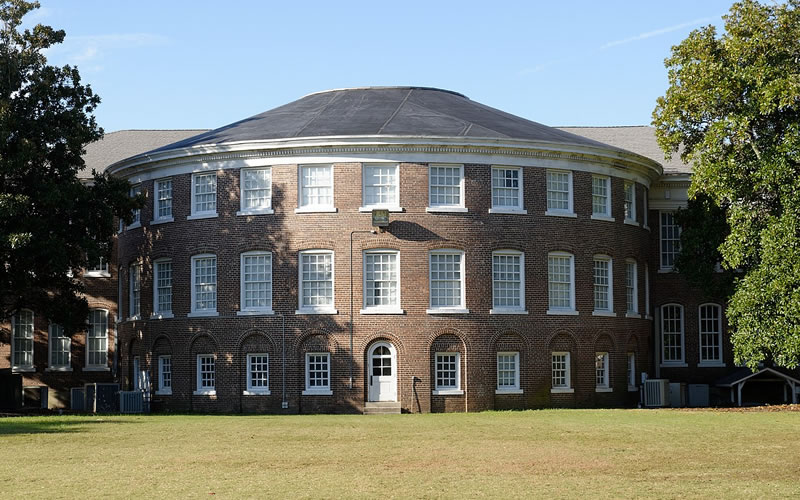
The rounded part of this building caught our eye. It’s in South Carolina, but where? Send your guess to feedback@statehousereport.com. And don’t forget to include your name and the town in which you live.
Our previous Mystery Photo
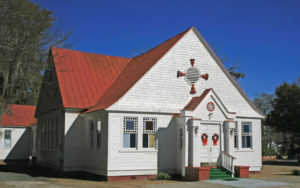 Our Dec. 21 mystery, “A Lowcountry building decked out for the holidays,” was a gift from longtime sleuth Bill Segars of Hartsville. He sent us a picture of the Fishers of Men Total Man Deliverance Ministry church in downtown Walterboro. Built in 1897 as the First Baptist Church, it later became St. John’s Independent Methodist Church before becoming home to its current congregation.
Our Dec. 21 mystery, “A Lowcountry building decked out for the holidays,” was a gift from longtime sleuth Bill Segars of Hartsville. He sent us a picture of the Fishers of Men Total Man Deliverance Ministry church in downtown Walterboro. Built in 1897 as the First Baptist Church, it later became St. John’s Independent Methodist Church before becoming home to its current congregation.
Bill’s mystery was pretty tough for our readers, but not for two determined photo detectives: George Graf of Palmyra, Va., and Jay Altman of Columbia. Great job, guys!
Graf sent some more information: “According to scpictureproject.org: This charming Queen Anne-style church in Walterboro was built around the turn of the twentieth century for the First Baptist Church of Walterboro. The church used this building until 1954. When the congregation built a new church in the mid-century, this sanctuary became the home of St. John’s Independent Methodist Church. Today the Fishers of Men Ministry, a Pentecostal congregation, occupies the historical cruciform church.”
Send us a mystery: If you have a photo that you believe will stump readers, send it along (but make sure to tell us what it is because it may stump us too!) Send to: feedback@statehousereport.com and mark it as a photo submission. Thanks.
S.C. ENCYCLOPEDIA
HISTORY: Columbia College
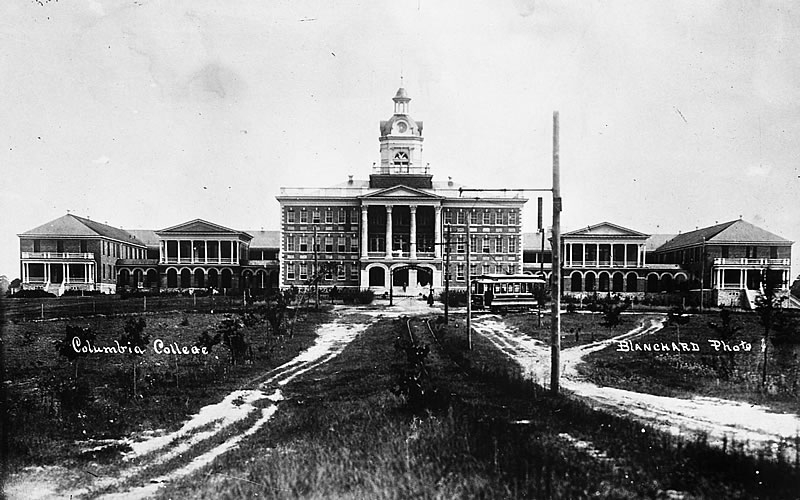
S.C. Encyclopedia | Chartered in 1854 by the South Carolina Methodist Conference, Columbia College is the eleventh-oldest women’s college in the United States and one of only two women’s colleges in South Carolina.
Initially opened as Columbia Female College, its first students entered in 1859 in a newly erected facility on Plain Street (now Hampton Street) in Columbia. The faculty was comprised of ten women and six men, under the presidency of Whitefoord Smith, a prominent Methodist minister. The student body numbered 121, and 13 students comprised the first graduating class in June 1860. The college closed after the Civil War and reopened in 1873. In 1882 a group of graduates established the Columbia College Alumnae Association to further the aims of the institution; it was the fifth such organization of women’s college graduates in the country.
The college dropped the word “female” from its official name in 1904. In 1905 the institution relocated to a new facility on land donated by the benefactors F. H. Hyatt and John T. Sloan in the Eau Claire neighborhood, north of the city. Although this facility was destroyed by fire in 1909, the college quickly rebuilt. It was accredited by the Southern Association of Schools and Colleges in 1938.
In 1948 the Methodist Conference merged Columbia College and Wofford College under a single administration at Wofford. Alumnae and friends convinced conference leaders to reinstate Columbia College as an autonomous institution in 1950. Under the presidency of R. Wright Spears (1951–1977), the college began a significant building program and enrollment dramatically increased. Fire swept the campus once again in 1964, and alumnae worked closely with President Spears to raise funds for new buildings. Columbia College admitted its first African American students in 1966.
Throughout its history, the college has focused its attention on the higher educational needs of women, and curricular offerings have reflected the social and economic changes impacting women’s experiences. Public service has been a key emphasis in the college’s mission. Among the college’s most notable graduates are Wil Lou Gray (class of 1903), champion of adult education and literacy programs in South Carolina; Elizabeth Johnson Patterson (class of 1961), the first woman from South Carolina elected to a full term in the United States Congress; and Karen Johnson Williams (class of 1973), the first woman to serve on the Fourth Circuit of the United States Court of Appeals.
The college curriculum is grounded in the liberal arts tradition. Undergraduate majors are offered in forty-two academic areas, and the college confers bachelor of arts, bachelor of science, bachelor of fine arts, and bachelor of music degrees. The college implemented a coeducational undergraduate evening division in 1999 and provides coeducational graduate programs in education and conflict management.
Columbia College is governed by a board of trustees approved by the South Carolina United Methodist Conference. The board selected its first woman president, Phyllis O. Bonanno, in 1997. Caroline Bagley Whitson was selected in 2001 as Columbia College’s seventeenth president. Its current president is Dr. Carol Moore.
— Excerpted from an entry by Belinda F. Gergel. This entry hasn’t been updated since 2006. To read more about this or 2,000 other entries about South Carolina, check out The South Carolina Encyclopedia, published in 2006 by USC Press. (Information used by permission.)
ABOUT STATEHOUSE REPORT
Statehouse Report, founded in 2001 as a weekly legislative forecast that informs readers about what is going to happen in South Carolina politics and policy, is provided to you at no charge every Friday.
- Editor and publisher: Andy Brack, 843.670.3996
- Statehouse correspondent: Lindsay Street
More
- Mailing address: Send inquiries by mail to: P.O. Box 22261, Charleston, SC 29407
- Subscriptions are free: Click to subscribe.
- We hope you’ll keep receiving the great news and information from Statehouse Report, but if you need to unsubscribe, go to the bottom of the weekly email issue and follow the instructions.
- © 2018, Statehouse Report. All rights reserved.


